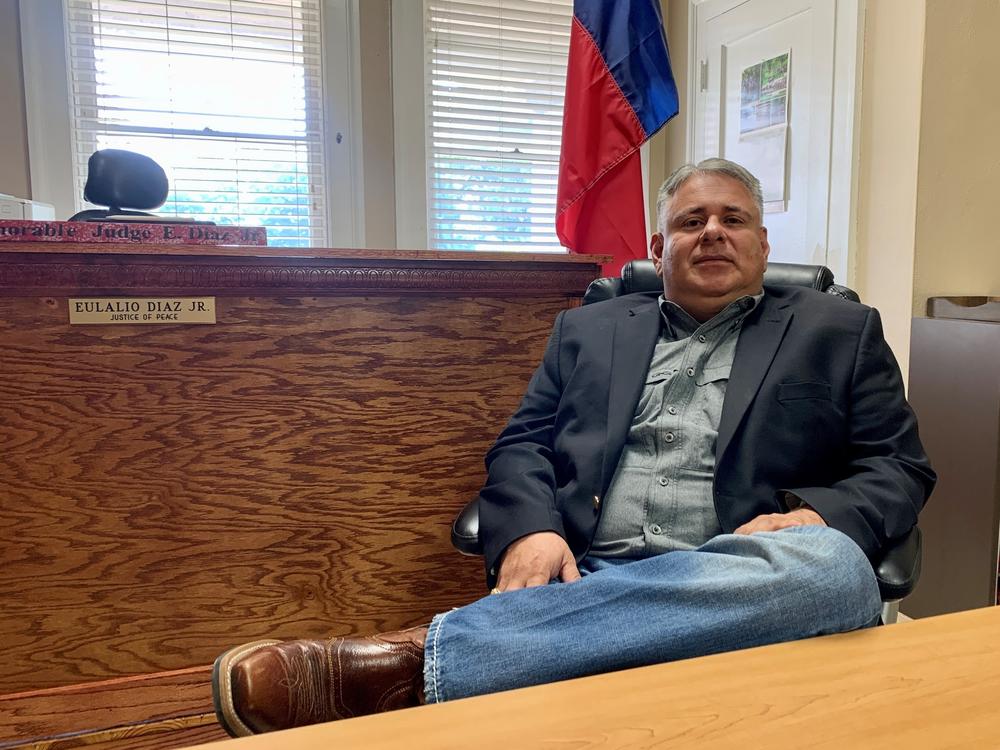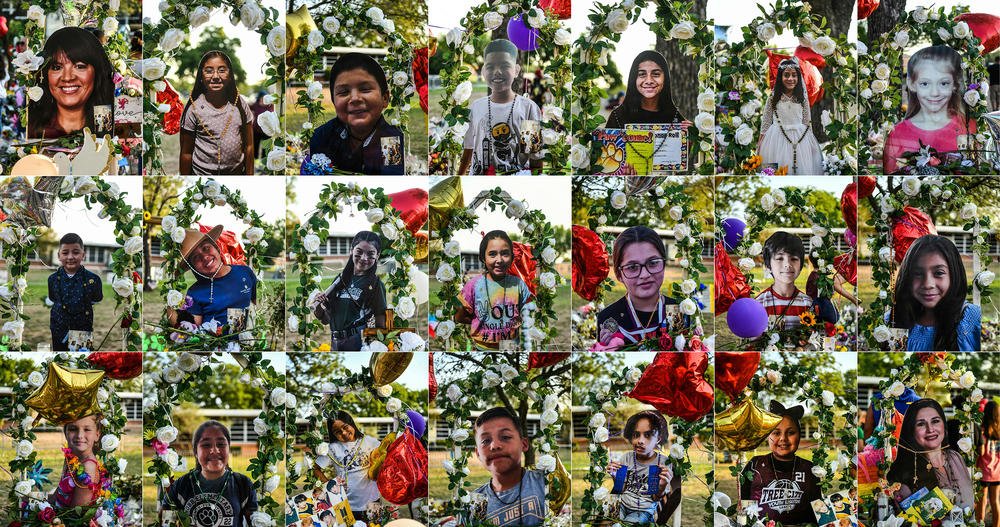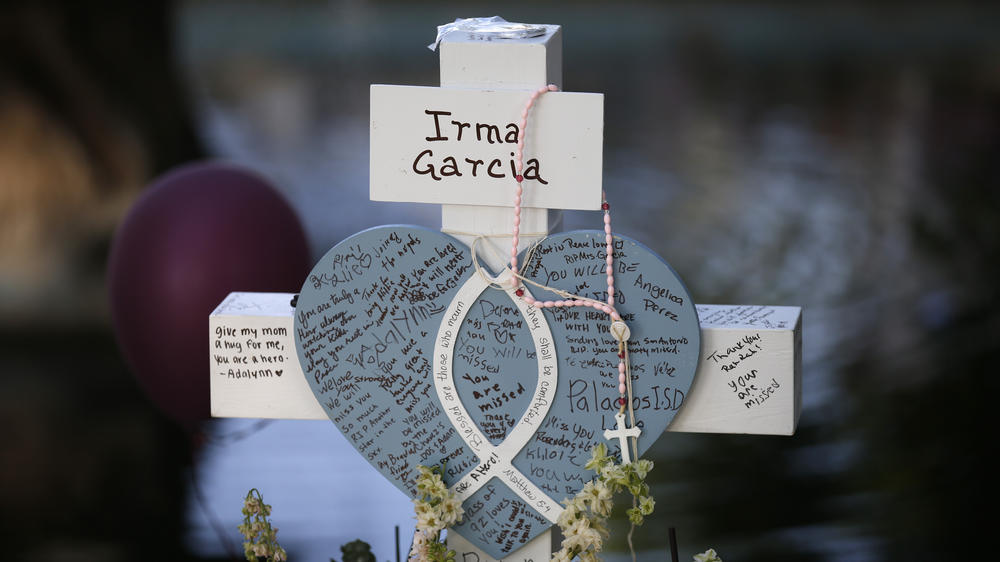Section Branding
Header Content
A Uvalde coroner is haunted by identifying the bodies of children and an old friend
Primary Content
UVALDE, Texas — Eulalio "Lalo" Diaz, Jr. isn't always on call, but it was his turn to be at the helm as Uvalde's Justice of the Peace on the day a gunman massacred 19 children and two teachers at Robb Elementary School in the deadliest school shooting in state history. The county is so small that the justice on call also acts as Uvalde's de facto coroner.
He doesn't expect he'll ever be the same.
"It was my luck ... my bad luck," Diaz told NPR. "But I wouldn't wish it on anyone."
Sitting in his office at the Uvalde County Courthouse, across the street from a makeshift memorial in the town square, Diaz recalled the shock of walking into the site of the slaughter that included so many small children whose parents and grandparents he's known for years, and one of his own high school classmates.
"I know both teachers, their husbands," he said.
"I know probably three quarters of the kids' families or their grandparents. It's just that type of community and it's close," Diaz said.
Despite the connections, Diaz explained, "It was my job to identify the bodies."
Because there is no local medical examiner's office, the Justice of the Peace regularly steps in as the county coroner, in addition to presiding over misdemeanor court cases, small civil disputes, and marriage ceremonies.
Last week, that meant that Diaz was the one who got called to the school to put names to the small, ravaged bodies of mostly 9 and 10 year old children before they could be autopsied.
"It's just the most devastating news you'd want to hear," he said, shaking his head.
Nothing could have prepared him for what awaited at the school
The case was so grisly, and so unlike anything he'd ever had to face, that it required extra help from the Bexar County Medical Examiner in San Antonio. (Up until last Tuesday, Diaz said the incident with the most casualties that he had ever dealt with was when an 18-wheeler hit and killed a family of four a few years ago).
While he waited for the medical examiner to make the drive to Uvalde, Diaz tried to steel himself.
"For two hours, I sat there, preparing myself and getting ready for the scene we're about to see ... because you know it's going to be a tough scene," he said.
There was an inner monologue running through his mind, he said, along the lines of: "You have to be strong and you have to maintain professionalism because the families are counting on you now."
But nothing could have prepared him for what was waiting for him inside.
He saw first-hand what a semi-automatic can do to kids
When they entered the school, he and the medical examiner found that the first responders had moved the bodies – separating the deceased from the wounded – in order to get to those who needed medical assistance.
"So when we got there, there were children in four rooms – the initial two rooms plus two other rooms," Diaz said, adding that they "went room by room getting the plan together on what we were going to need to make sure that we identified everybody correctly."
Diaz did not describe the scene in detail. Instead, he said, "It's something you never want to see and it's something you don't, you cannot, prepare for. It's a picture that's going to stay in my head forever, and that's where I'd like for it to stay."
He says he has no intention of ever sharing exactly what he saw.
The AR-15, which is the weapon used by the gunman at Robb Elementary, is designed to blow targets apart. It's a weapon built for war. And when fired into a human adult body, its bullets travel with such fierce velocity that they can decapitate a person, or leave a body looking "like a grenade went off in there," as Peter Rhee, a trauma surgeon at the University of Arizona, told Wired. The carnage the weapon leaves behind has become a signature of school shootings and other mass shootings across the country.
Unfortunately, Diaz has now seen first-hand what such a weapon can do to children with small bones and limbs, which made the process of identifying them even more agonizing.
He found an old classmate among the victims
Diaz had to confront another chilling discovery: among the dead, lying still on the floor of the same elementary school he attended as a child, was an old classmate — Irma Garcia, one of the two teachers who was killed that day.
"She was one year younger than me through junior high and high school, and I knew her husband," he said, referring to Joe Garcia, who died of a heart attack two days later. "He was a year older than me. They had been high school sweethearts. I've known them all my life."
He knows he'll need help to process the trauma
Holding his head in his hands, at the end of a long day, Diaz said the scene will haunt him for the rest of his life.
He admits that he's probably still operating on adrenaline, and the demands of the situation are keeping him so busy that he doesn't have time to think. But he said that when he gets opportunity to come up for air, he plans to seek some sort of help to process the trauma of what he has witnessed.
It is not uncommon for people who are tasked with identifying bodies to develop posttraumatic stress disorder, Diaz said.
Mass shootings like the one in Uvalde can cause long-lasting trauma "because you keep remembering," he said.
For now, he's turning to his family and friends, and other Justices of the Peace, who he says are the only other people who understand what he's going through: "They've lived it. They understand it. They've seen some scenes that have been horrific."
Copyright 2022 NPR. To see more, visit https://www.npr.org.



